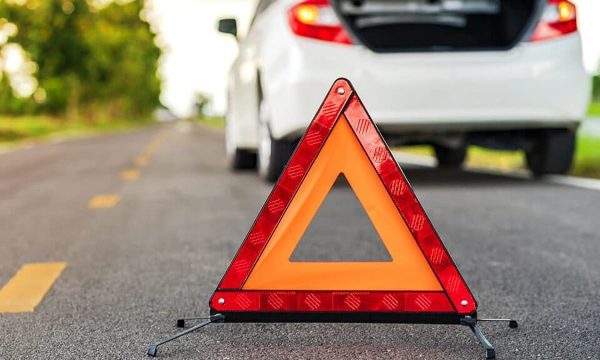Moving into your first apartment marks a major milestone for young adults. Transitioning from parental or dorm living, having your own space offers freedom and independence. Yet, with this newfound autonomy, the responsibility of protecting your possessions and area arises. In case of unexpected events such as fire or theft, your landlord might not offer support.
Toc
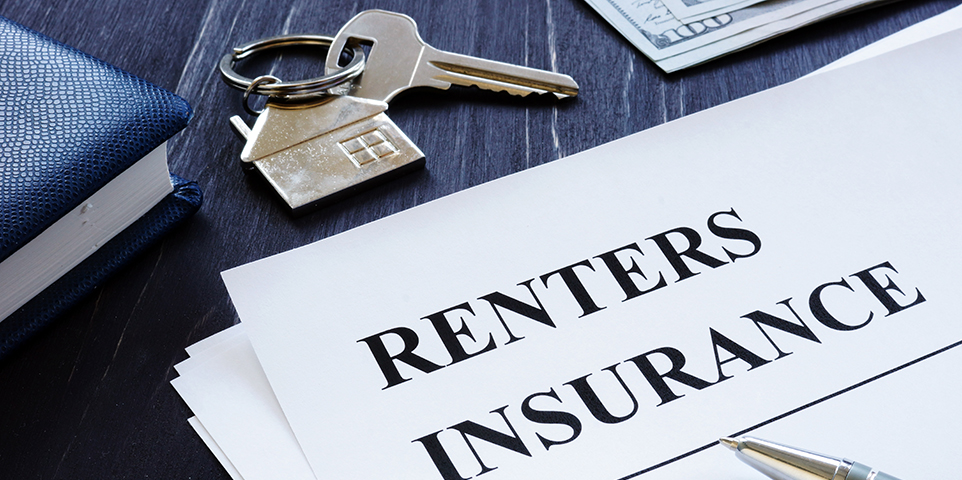
For safeguarding your personal property and liability, it’s wise to invest in renters insurance once you’ve signed the lease. Even if you’re a conscientious tenant in a secure neighborhood, renters insurance is a crucial safeguard. It provides coverage for personal belongings and liability at a reasonable price.
Here’s a comprehensive guide to renters insurance, detailing its coverage, exclusions, and recommended coverage amounts.
What is renters insurance and how does it work?

First things, first. What even is renters insurance?
Renters insurance is an insurance policy that specifically protects renters, whether you rent an apartment or a single-family house. It provides coverage for a variety of scenarios, like theft, fires, weather-related damage, and certain lawsuits related to third-party liability claims.
If you experience a covered loss (like your TV gets stolen, for example), you file a claim with your insurance company, and if the loss is approved, you receive a payout. Renters insurance has policy limits, so the maximum payout is based on the amount of coverage you have.
In many ways, renters insurance coverage is very similar to homeowners insurance. The main difference is that renters insurance doesn’t provide any coverage for the structure of your apartment building, because you are only responsible for your individual unit.
Homeowners insurance is much more expensive than renters insurance, in part because it includes coverage for the physical structure of your house.
What is covered under a renters insurance policy?
Having a renters insurance policy will protect you financially in a variety of situations that you might face as a tenant. While each renters insurance policy is slightly different, here are the things you can expect.
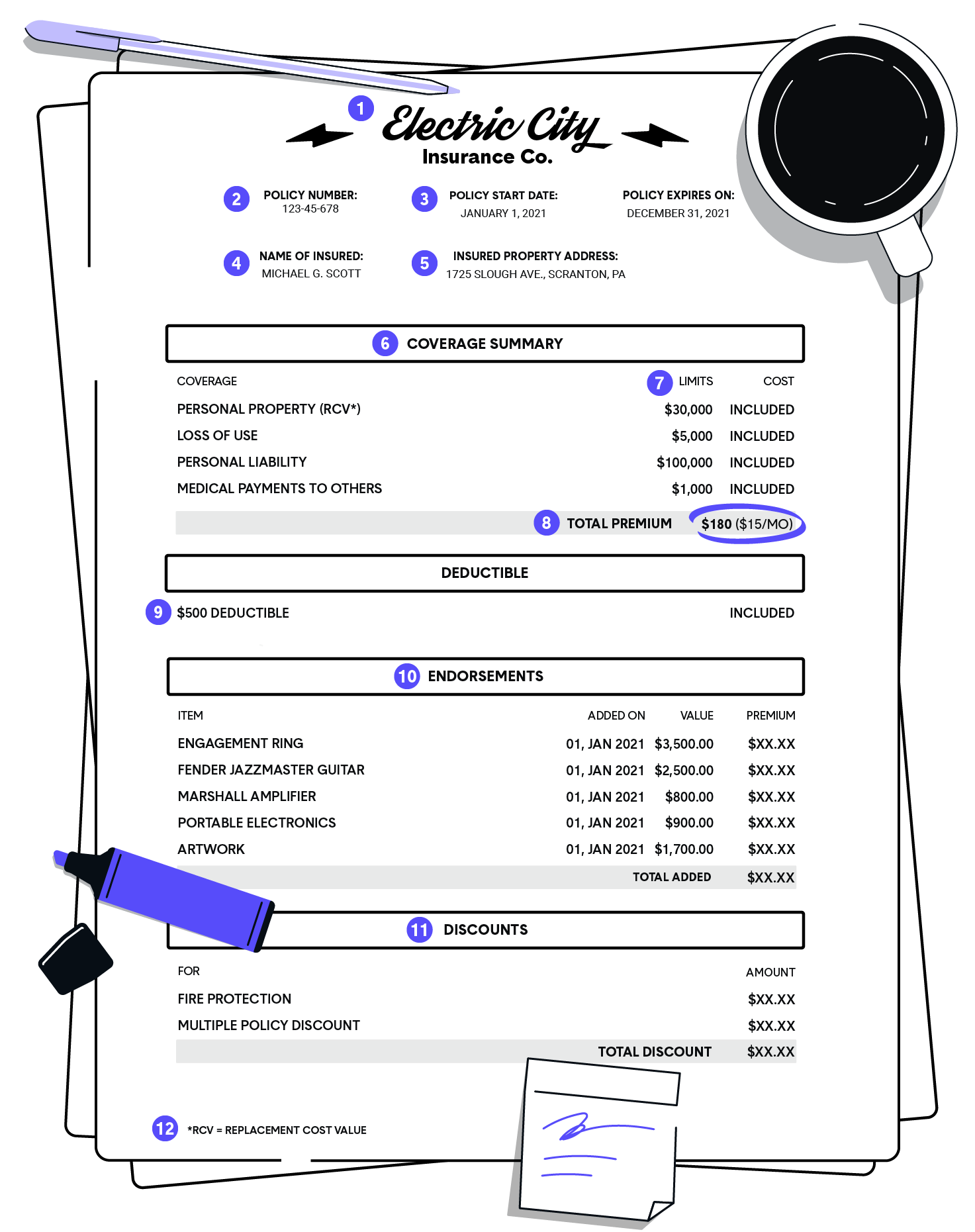
The personal items inside your apartment
A basic renters insurance policy includes personal property coverage, which protects all the stuff you own, like clothing, appliances, and furniture. If any personal property gets damaged in a covered peril, your insurance carrier will reimburse you for it, up to the policy limit.
So, what perils are covered? Here’s a quick look:
- Fire, lightning, and smoke damage.
- Wind and hail damage.
- Theft.
- Vandalism.
- Damage caused by the weight of ice, sleet, or snow.
- Damage caused by vehicles or planes.
- Explosions.
- Riots.
- Falling objects.
- Accidental and sudden water damage.
- Accidental and sudden electrical surges.
- Eruptions.
If any of your personal property gets damaged and you need to file a claim, you will probably be reimbursed for the item’s actual cash value (ACV), which is calculated based on the item’s original cost, minus depreciation.
Some insurance companies allow you to upgrade to a replacement cost coverage (RCV) policy, for a few extra dollars per month. With an RCV policy, you get reimbursed for the item’s original value, without depreciation factored into the payout.
One last note on personal property coverage: valuable items, like jewelry, electronics, collections, money, and art, usually have their own coverage limits that are lower than the overall policy limit.
The good news is that most insurers offer an endorsement called scheduled personal property coverage that can increase your coverage limits for these more expensive items. Adding this endorsement to your policy shouldn’t raise your premium by much.
1. https://viralblogspost.com/archive/3286/
2. https://viralblogspost.com/archive/3576/
3. https://viralblogspost.com/archive/2294/
The personal belongings outside your apartment
Renters insurance doesn’t just cover the stuff you keep inside your apartment. It also extends coverage to personal property that is outside of your apartment — anywhere in the world.
So, for example, let’s say you take a once-in-a-lifetime ski trip to the Swiss Alps. You head back to the slopes after a quick hot chocolate break in the lodge, and you realize that your skis are nowhere to be found. Fortunately, your renters insurance policy would cover it and give you some money for a new pair.
Renters insurance will also cover personal property that is in your vehicle.
For instance, let’s say you get into a bad accident and your car catches fire. (We hope that never happens!) You walked away unharmed, but your brand new laptop was in the backseat. You could file a claim with your renters insurance company and get reimbursed for the cost of a new computer.
Have items permanently stored in a storage unit? Renters insurance covers that stuff, too.
However, the one major caveat with coverage for personal belongings outside your apartment is that they are typically subject to a much lower policy limit, usually at about 10% of your personal property limit.
Here’s an example. Imagine you have renters insurance with $50,000 in personal property coverage. If any items kept inside your apartment get damaged or stolen, you can get reimbursed up to $50,000. However, if you had $50,000 worth of belongings in a storage unit, you might only get $5,000 in coverage for those items in a different location.
Your liabilities as a renter
Personal liability insurance is included with every renters insurance policy. It has two parts: bodily injury liability coverage and property damage liability coverage. This policy protects you financially if you ever get sued by a third-party for an injury or property damage.
Here’s what you need to know about both types of coverage.
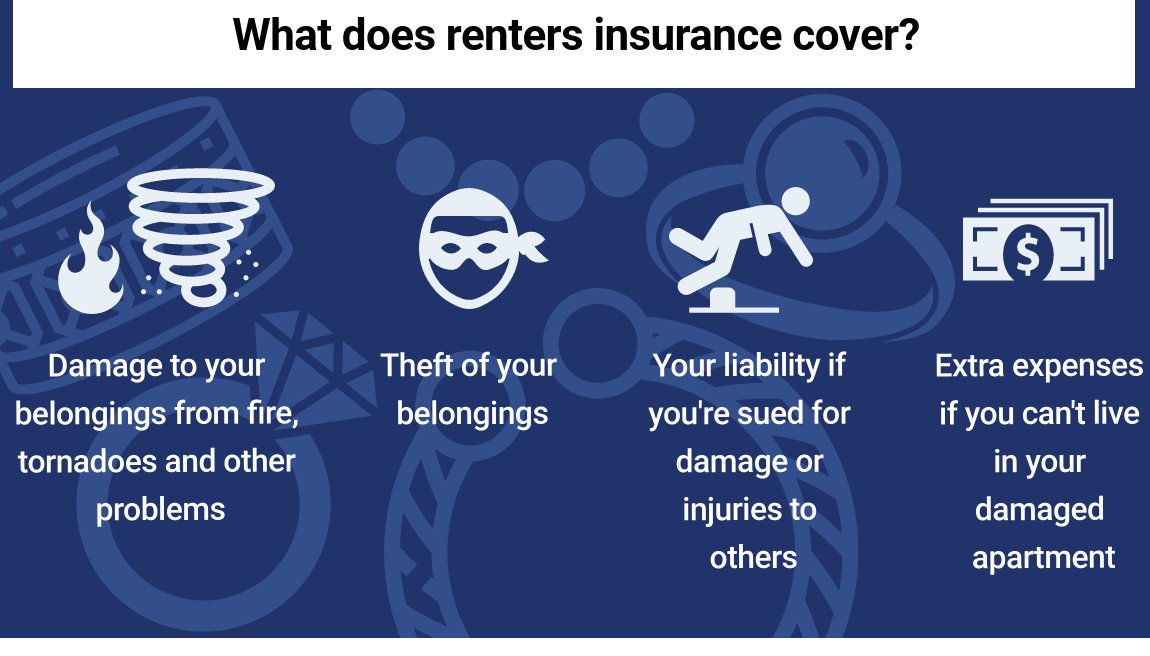
Bodily injury
If you are found to be responsible for an injury that occurs in your apartment, the bodily injury liability portion of your renters insurance policy will kick in.
For example, imagine you invite a few friends over to watch the Super Bowl on your brand new 60-inch TV. However, you set up the TV in a hurry, and one of your friends trips over a loose cord that you forgot to tuck away. Your friend sprains their ankle and needs to get it checked out at the ER.
To make matters worse, this friend doesn’t have health insurance, so they have to foot the entire medical bill out-of-pocket. To recoup that money, they could decide to sue you for the injury. Fortunately, your bodily injury liability policy would pay for your legal fees, plus a settlement with your friend.
One thing to know about bodily injury liability coverage is that some types of injuries are not covered by insurance. A good example is dog bites. If you own a dog that’s on your insurance company’s “restricted breed” list, like a pitbull or Rottweiler, and the dog bites someone in your apartment, insurance may not cover it.
Property damage
If you are found to be responsible for causing accidental damage to someone else’s property, the property damage liability portion of your policy takes effect.
For instance, let’s say you kindly volunteer to help your sibling move into their new apartment. You start to walk upstairs with the portable air conditioner, but some leftover water drips out and you slip, dropping the unit. It leaves a huge scratch in the floor that needs to be repaired. In this case, you could file a claim with your renters insurance company to have the floor fixed.
Medical expenses if a guest gets injured
In the event that someone gets injured at your apartment and needs medical treatment, your medical expenses policy will compensate them for their medical bills. Even if you weren’t at-fault for the injury, you can still use this coverage.
Medical expenses coverage usually has a lower policy limit, typically around $10,000 or less, depending on your insurance carrier. It will cover a variety of costs, including:
1. https://viralblogspost.com/archive/2294/
2. https://viralblogspost.com/archive/2428/
3. https://viralblogspost.com/archive/3578/
- X-rays.
- Ambulance rides.
- Emergency room visits.
- Surgeries.
- Hospital stays.
- Lost wages (if the person is unable to work due to their injury).
- Rehabilitation costs, like physical therapy.
Before I move on, I should mention that medical payments insurance will not provide any compensation for your medical bills if you happen to get injured in your apartment. That’s what health insurance is for.
However, if you get injured in a common area of your apartment building, like a stairwell or an icy front walkway, your landlord’s insurance policy would cover your injuries.
Additional living expenses
The last standard coverage you get with a renters insurance policy is additional living expenses, which is sometimes called loss of use coverage. If your apartment unit or building becomes uninhabitable and you have to move out, this policy will cover expenses like:
- Temporary housing in a hotel.
- Restaurant bills.
- Parking.
- Laundry.
You might need to use your additional living expenses coverage if a fire damages your apartment building and it’s deemed structurally unsafe to live in. Or, if there is significant water damage in your unit after a major storm and you need to be out for several days in order for the repairs to take place.
Like all other renters insurance coverages, additional living expense coverage has a policy limit. Meaning, your insurance company won’t pay for you to take a luxury vacation while you are unable to be in your apartment, or while you look for a new place to live.
What renters insurance doesn’t cover
Standard renters insurance policies are pretty comprehensive. But like all types of insurance, renters insurance won’t cover everything you might face as a tenant. Here are some of the things that a basic renters policy won’t cover:
- Damage to common spaces, like lobbies and elevators.
- Flooding.
- Earthquake damage.
- Intentional damage.
- Rust and mold.
- Infestations, like rodents or bed bugs.
- General wear and tear.
- Maintenance.
I should note that you can get coverage for some of these perils, if your insurance company offers an endorsement or a separate policy. For example, most insurance companies sell flood insurance through the National Flood Insurance Program. Earthquake insurance is also available if you live in a high-risk area.
How much renters insurance should you have?
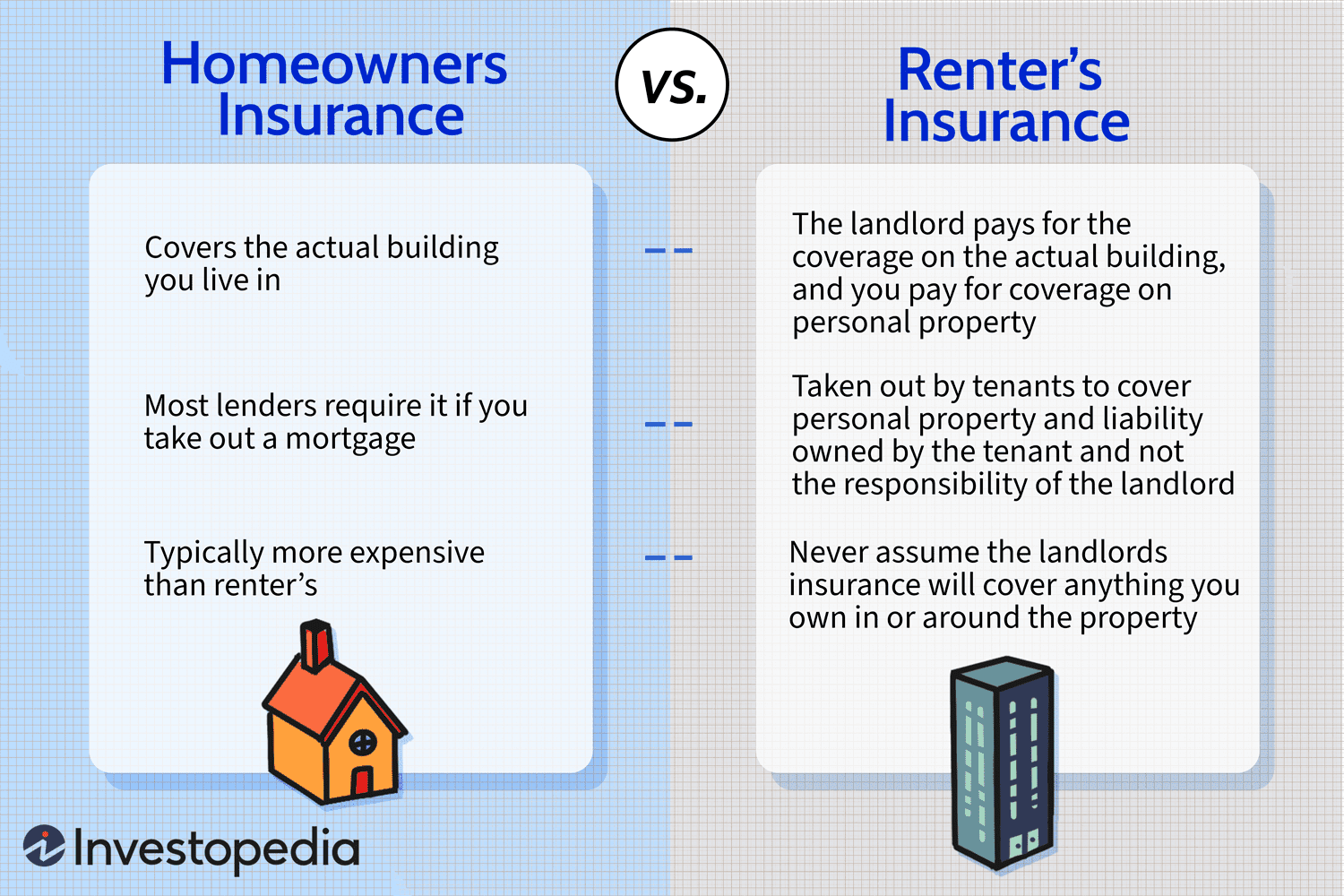
Now that we’ve discussed what renters insurance covers, let’s talk about how much renters insurance coverage you should have for optimal protection.
Ultimately, every renter has different insurance needs. For instance, if you live a minimalist lifestyle, you might only have $5,000 worth of belongings. On the other hand, you might be someone who loves fashion and has $5,000 worth of clothes in your closet alone.
As a general rule of thumb, you should have enough personal property insurance to cover the value of the belongings you own. You can either estimate the value, or put together a more thorough inventory of all your things and add up the cost of each item.
For liability insurance, most policies come standard with $100,000 in coverage, which is adequate for most tenants. However, if you love entertaining and having people over, or if you have a dog, you might benefit from higher liability limits to give you some extra protection.
In terms of medical payments coverage and additional living expenses, these policies usually have fixed coverage limits. However, you may be able to opt for additional coverage, depending on your insurance carrier.
Summary
Having renters insurance coverage is beneficial for every apartment renter, no matter where you live, how much stuff you own, or how careful you are. For most people, insurance claims come out of left field, and having insurance can provide valuable financial protection if something does go wrong.
If you’re still on the fence about renters coverage, I always like to stress that renters insurance is extremely affordable, especially compared to homeowners insurance. According to the Insurance Information Institute, the average renters insurance premium is just $179 per year, which is less than $15 per month. That’s as much as your Netflix subscription, or roughly three trips to Starbucks.
Renters insurance is a no-brainer, in my opinion. For me, it provides much-needed peace of mind, and it can save you from major financial stress if the unexpected were to happen.




